Report on Business Context, CSR, and Sainsbury's Leadership Analysis
VerifiedAdded on 2021/02/19
|12
|3899
|17
Report
AI Summary
This report delves into the dynamic and evolving nature of the business environment, considering future trends within a global context. It examines the impact of Corporate Social Responsibility (CSR) on social, cultural, economic, and environmental issues, highlighting the importance of ethical practices and transparency. The report then focuses on the retail sector, specifically analyzing Sainsbury's. It provides an overview of the organization, including its vision, leadership style (transformational), and management practices. The analysis includes the influence of culture and management style on business functions, with recommendations for improvement. The report emphasizes the importance of adapting to changes in consumer demand, technological advancements, and external factors to ensure business growth and profitability. It also underscores the significance of ethical considerations and environmental sustainability in achieving long-term success.
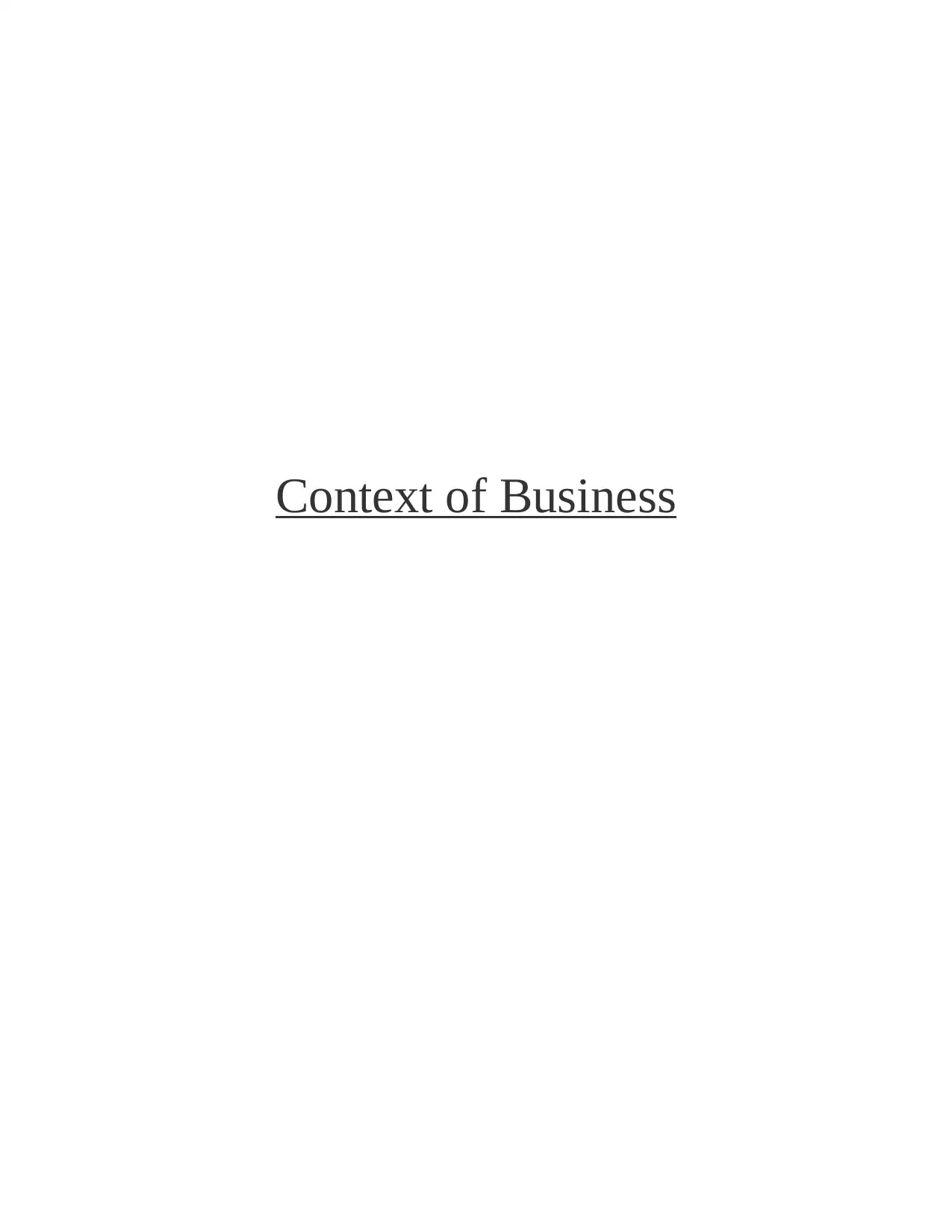
Context of Business
Paraphrase This Document
Need a fresh take? Get an instant paraphrase of this document with our AI Paraphraser
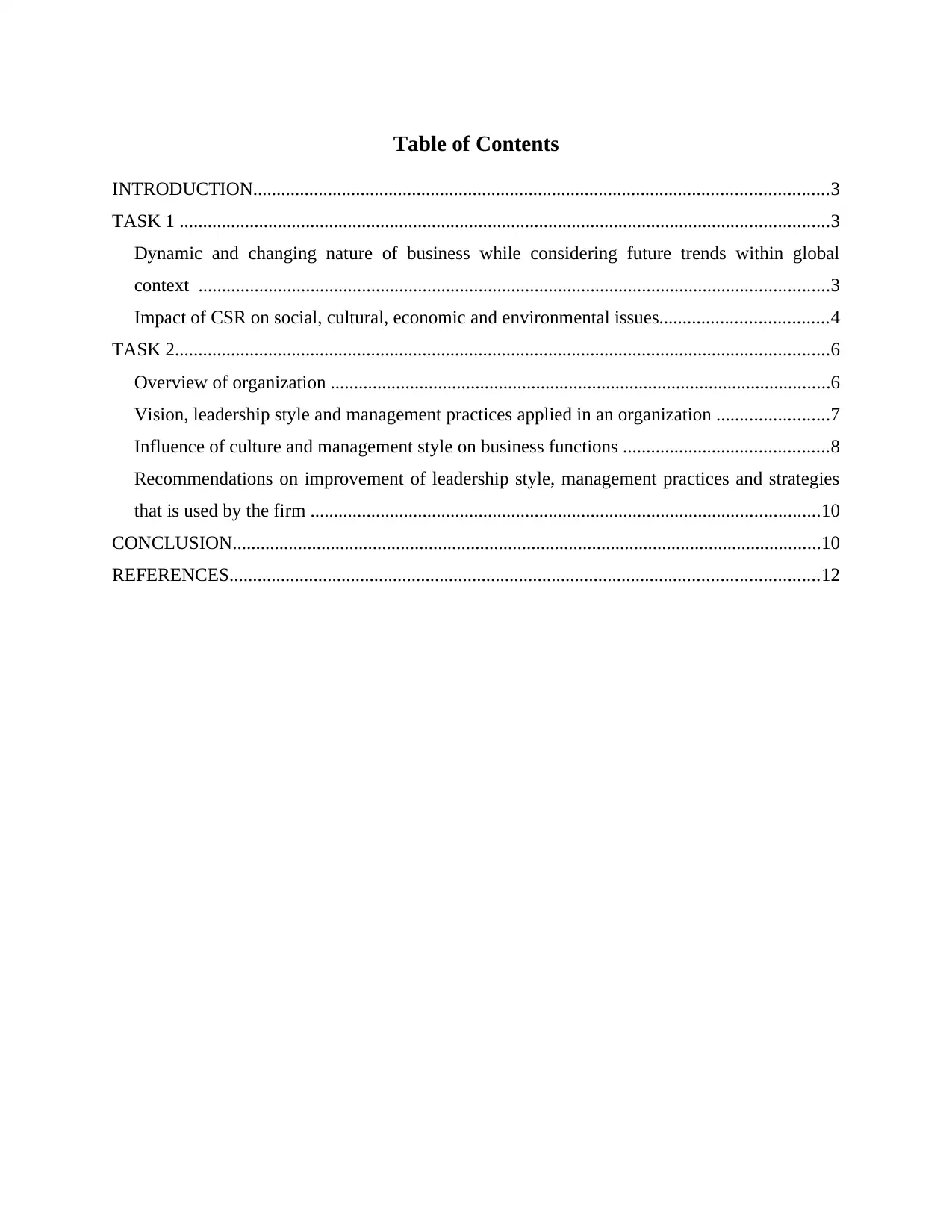
Table of Contents
INTRODUCTION...........................................................................................................................3
TASK 1 ...........................................................................................................................................3
Dynamic and changing nature of business while considering future trends within global
context .......................................................................................................................................3
Impact of CSR on social, cultural, economic and environmental issues....................................4
TASK 2............................................................................................................................................6
Overview of organization ...........................................................................................................6
Vision, leadership style and management practices applied in an organization ........................7
Influence of culture and management style on business functions ............................................8
Recommendations on improvement of leadership style, management practices and strategies
that is used by the firm .............................................................................................................10
CONCLUSION..............................................................................................................................10
REFERENCES..............................................................................................................................12
INTRODUCTION...........................................................................................................................3
TASK 1 ...........................................................................................................................................3
Dynamic and changing nature of business while considering future trends within global
context .......................................................................................................................................3
Impact of CSR on social, cultural, economic and environmental issues....................................4
TASK 2............................................................................................................................................6
Overview of organization ...........................................................................................................6
Vision, leadership style and management practices applied in an organization ........................7
Influence of culture and management style on business functions ............................................8
Recommendations on improvement of leadership style, management practices and strategies
that is used by the firm .............................................................................................................10
CONCLUSION..............................................................................................................................10
REFERENCES..............................................................................................................................12
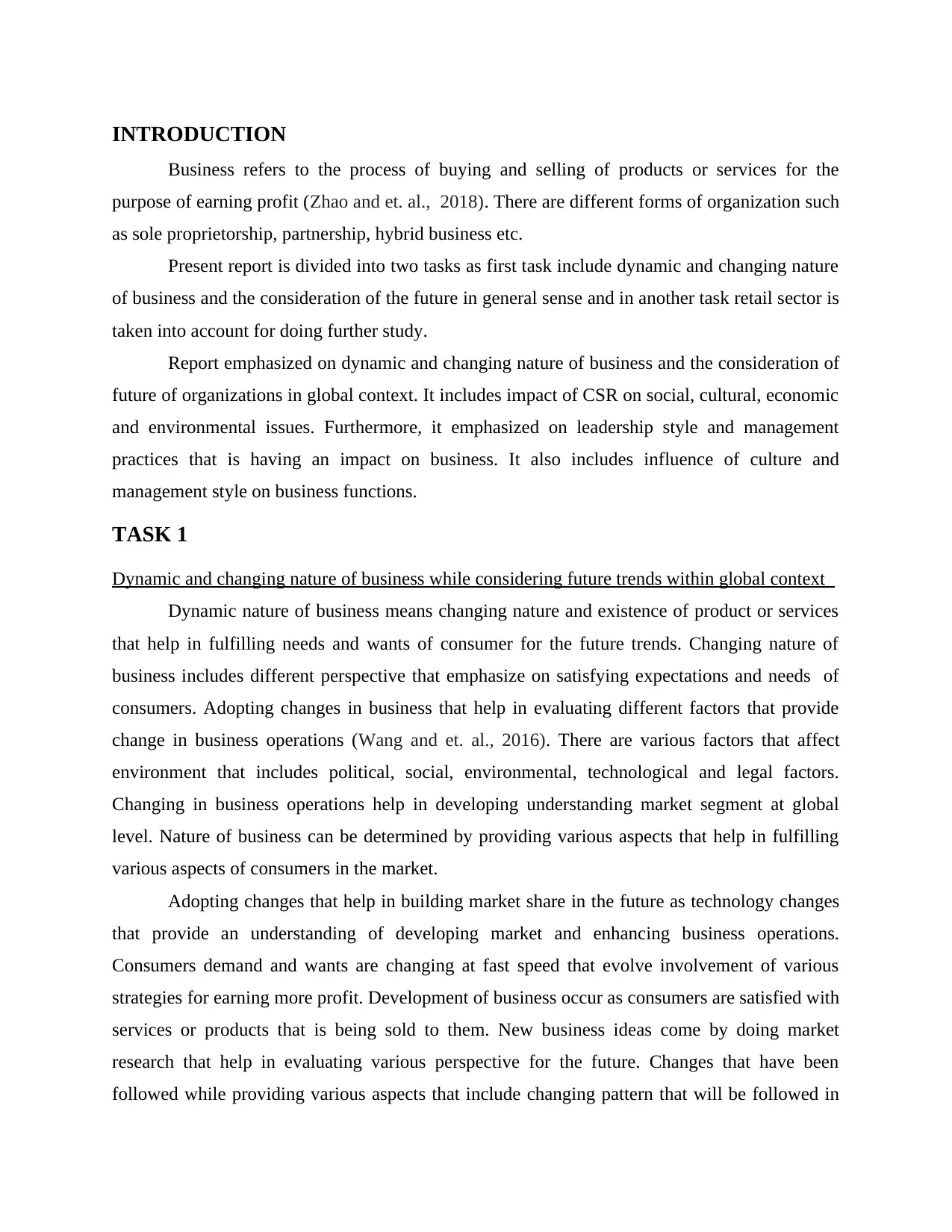
INTRODUCTION
Business refers to the process of buying and selling of products or services for the
purpose of earning profit (Zhao and et. al., 2018). There are different forms of organization such
as sole proprietorship, partnership, hybrid business etc.
Present report is divided into two tasks as first task include dynamic and changing nature
of business and the consideration of the future in general sense and in another task retail sector is
taken into account for doing further study.
Report emphasized on dynamic and changing nature of business and the consideration of
future of organizations in global context. It includes impact of CSR on social, cultural, economic
and environmental issues. Furthermore, it emphasized on leadership style and management
practices that is having an impact on business. It also includes influence of culture and
management style on business functions.
TASK 1
Dynamic and changing nature of business while considering future trends within global context
Dynamic nature of business means changing nature and existence of product or services
that help in fulfilling needs and wants of consumer for the future trends. Changing nature of
business includes different perspective that emphasize on satisfying expectations and needs of
consumers. Adopting changes in business that help in evaluating different factors that provide
change in business operations (Wang and et. al., 2016). There are various factors that affect
environment that includes political, social, environmental, technological and legal factors.
Changing in business operations help in developing understanding market segment at global
level. Nature of business can be determined by providing various aspects that help in fulfilling
various aspects of consumers in the market.
Adopting changes that help in building market share in the future as technology changes
that provide an understanding of developing market and enhancing business operations.
Consumers demand and wants are changing at fast speed that evolve involvement of various
strategies for earning more profit. Development of business occur as consumers are satisfied with
services or products that is being sold to them. New business ideas come by doing market
research that help in evaluating various perspective for the future. Changes that have been
followed while providing various aspects that include changing pattern that will be followed in
Business refers to the process of buying and selling of products or services for the
purpose of earning profit (Zhao and et. al., 2018). There are different forms of organization such
as sole proprietorship, partnership, hybrid business etc.
Present report is divided into two tasks as first task include dynamic and changing nature
of business and the consideration of the future in general sense and in another task retail sector is
taken into account for doing further study.
Report emphasized on dynamic and changing nature of business and the consideration of
future of organizations in global context. It includes impact of CSR on social, cultural, economic
and environmental issues. Furthermore, it emphasized on leadership style and management
practices that is having an impact on business. It also includes influence of culture and
management style on business functions.
TASK 1
Dynamic and changing nature of business while considering future trends within global context
Dynamic nature of business means changing nature and existence of product or services
that help in fulfilling needs and wants of consumer for the future trends. Changing nature of
business includes different perspective that emphasize on satisfying expectations and needs of
consumers. Adopting changes in business that help in evaluating different factors that provide
change in business operations (Wang and et. al., 2016). There are various factors that affect
environment that includes political, social, environmental, technological and legal factors.
Changing in business operations help in developing understanding market segment at global
level. Nature of business can be determined by providing various aspects that help in fulfilling
various aspects of consumers in the market.
Adopting changes that help in building market share in the future as technology changes
that provide an understanding of developing market and enhancing business operations.
Consumers demand and wants are changing at fast speed that evolve involvement of various
strategies for earning more profit. Development of business occur as consumers are satisfied with
services or products that is being sold to them. New business ideas come by doing market
research that help in evaluating various perspective for the future. Changes that have been
followed while providing various aspects that include changing pattern that will be followed in
⊘ This is a preview!⊘
Do you want full access?
Subscribe today to unlock all pages.

Trusted by 1+ million students worldwide
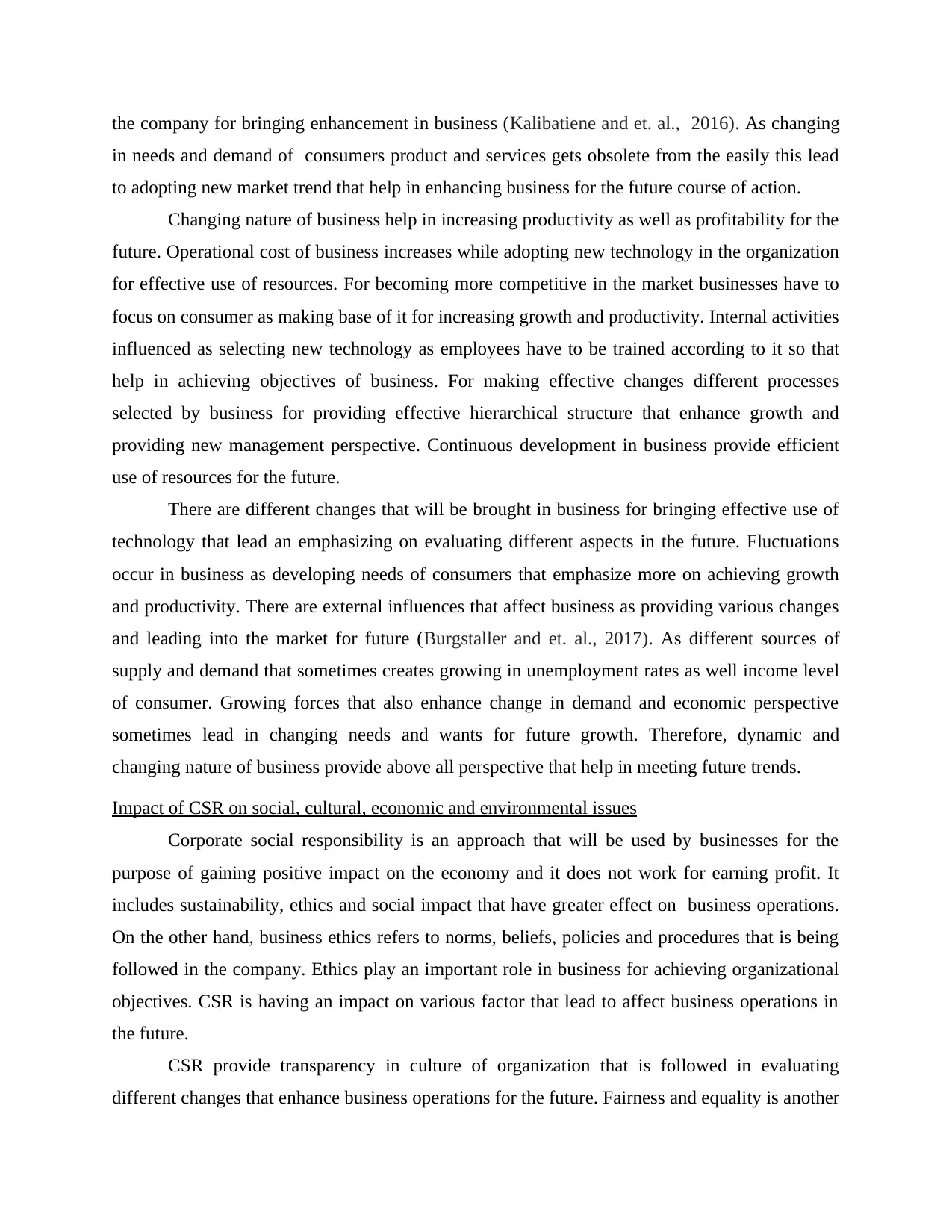
the company for bringing enhancement in business (Kalibatiene and et. al., 2016). As changing
in needs and demand of consumers product and services gets obsolete from the easily this lead
to adopting new market trend that help in enhancing business for the future course of action.
Changing nature of business help in increasing productivity as well as profitability for the
future. Operational cost of business increases while adopting new technology in the organization
for effective use of resources. For becoming more competitive in the market businesses have to
focus on consumer as making base of it for increasing growth and productivity. Internal activities
influenced as selecting new technology as employees have to be trained according to it so that
help in achieving objectives of business. For making effective changes different processes
selected by business for providing effective hierarchical structure that enhance growth and
providing new management perspective. Continuous development in business provide efficient
use of resources for the future.
There are different changes that will be brought in business for bringing effective use of
technology that lead an emphasizing on evaluating different aspects in the future. Fluctuations
occur in business as developing needs of consumers that emphasize more on achieving growth
and productivity. There are external influences that affect business as providing various changes
and leading into the market for future (Burgstaller and et. al., 2017). As different sources of
supply and demand that sometimes creates growing in unemployment rates as well income level
of consumer. Growing forces that also enhance change in demand and economic perspective
sometimes lead in changing needs and wants for future growth. Therefore, dynamic and
changing nature of business provide above all perspective that help in meeting future trends.
Impact of CSR on social, cultural, economic and environmental issues
Corporate social responsibility is an approach that will be used by businesses for the
purpose of gaining positive impact on the economy and it does not work for earning profit. It
includes sustainability, ethics and social impact that have greater effect on business operations.
On the other hand, business ethics refers to norms, beliefs, policies and procedures that is being
followed in the company. Ethics play an important role in business for achieving organizational
objectives. CSR is having an impact on various factor that lead to affect business operations in
the future.
CSR provide transparency in culture of organization that is followed in evaluating
different changes that enhance business operations for the future. Fairness and equality is another
in needs and demand of consumers product and services gets obsolete from the easily this lead
to adopting new market trend that help in enhancing business for the future course of action.
Changing nature of business help in increasing productivity as well as profitability for the
future. Operational cost of business increases while adopting new technology in the organization
for effective use of resources. For becoming more competitive in the market businesses have to
focus on consumer as making base of it for increasing growth and productivity. Internal activities
influenced as selecting new technology as employees have to be trained according to it so that
help in achieving objectives of business. For making effective changes different processes
selected by business for providing effective hierarchical structure that enhance growth and
providing new management perspective. Continuous development in business provide efficient
use of resources for the future.
There are different changes that will be brought in business for bringing effective use of
technology that lead an emphasizing on evaluating different aspects in the future. Fluctuations
occur in business as developing needs of consumers that emphasize more on achieving growth
and productivity. There are external influences that affect business as providing various changes
and leading into the market for future (Burgstaller and et. al., 2017). As different sources of
supply and demand that sometimes creates growing in unemployment rates as well income level
of consumer. Growing forces that also enhance change in demand and economic perspective
sometimes lead in changing needs and wants for future growth. Therefore, dynamic and
changing nature of business provide above all perspective that help in meeting future trends.
Impact of CSR on social, cultural, economic and environmental issues
Corporate social responsibility is an approach that will be used by businesses for the
purpose of gaining positive impact on the economy and it does not work for earning profit. It
includes sustainability, ethics and social impact that have greater effect on business operations.
On the other hand, business ethics refers to norms, beliefs, policies and procedures that is being
followed in the company. Ethics play an important role in business for achieving organizational
objectives. CSR is having an impact on various factor that lead to affect business operations in
the future.
CSR provide transparency in culture of organization that is followed in evaluating
different changes that enhance business operations for the future. Fairness and equality is another
Paraphrase This Document
Need a fresh take? Get an instant paraphrase of this document with our AI Paraphraser
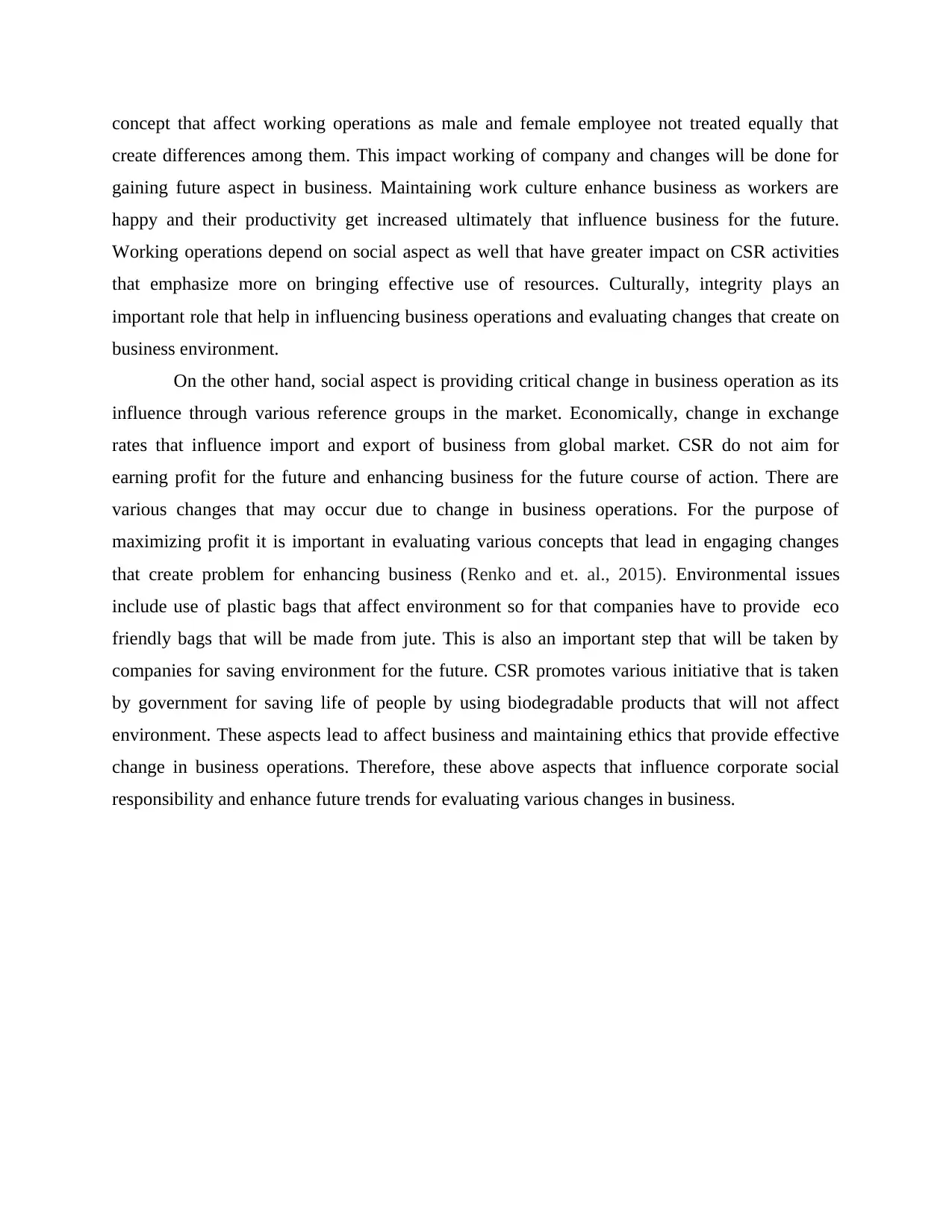
concept that affect working operations as male and female employee not treated equally that
create differences among them. This impact working of company and changes will be done for
gaining future aspect in business. Maintaining work culture enhance business as workers are
happy and their productivity get increased ultimately that influence business for the future.
Working operations depend on social aspect as well that have greater impact on CSR activities
that emphasize more on bringing effective use of resources. Culturally, integrity plays an
important role that help in influencing business operations and evaluating changes that create on
business environment.
On the other hand, social aspect is providing critical change in business operation as its
influence through various reference groups in the market. Economically, change in exchange
rates that influence import and export of business from global market. CSR do not aim for
earning profit for the future and enhancing business for the future course of action. There are
various changes that may occur due to change in business operations. For the purpose of
maximizing profit it is important in evaluating various concepts that lead in engaging changes
that create problem for enhancing business (Renko and et. al., 2015). Environmental issues
include use of plastic bags that affect environment so for that companies have to provide eco
friendly bags that will be made from jute. This is also an important step that will be taken by
companies for saving environment for the future. CSR promotes various initiative that is taken
by government for saving life of people by using biodegradable products that will not affect
environment. These aspects lead to affect business and maintaining ethics that provide effective
change in business operations. Therefore, these above aspects that influence corporate social
responsibility and enhance future trends for evaluating various changes in business.
create differences among them. This impact working of company and changes will be done for
gaining future aspect in business. Maintaining work culture enhance business as workers are
happy and their productivity get increased ultimately that influence business for the future.
Working operations depend on social aspect as well that have greater impact on CSR activities
that emphasize more on bringing effective use of resources. Culturally, integrity plays an
important role that help in influencing business operations and evaluating changes that create on
business environment.
On the other hand, social aspect is providing critical change in business operation as its
influence through various reference groups in the market. Economically, change in exchange
rates that influence import and export of business from global market. CSR do not aim for
earning profit for the future and enhancing business for the future course of action. There are
various changes that may occur due to change in business operations. For the purpose of
maximizing profit it is important in evaluating various concepts that lead in engaging changes
that create problem for enhancing business (Renko and et. al., 2015). Environmental issues
include use of plastic bags that affect environment so for that companies have to provide eco
friendly bags that will be made from jute. This is also an important step that will be taken by
companies for saving environment for the future. CSR promotes various initiative that is taken
by government for saving life of people by using biodegradable products that will not affect
environment. These aspects lead to affect business and maintaining ethics that provide effective
change in business operations. Therefore, these above aspects that influence corporate social
responsibility and enhance future trends for evaluating various changes in business.
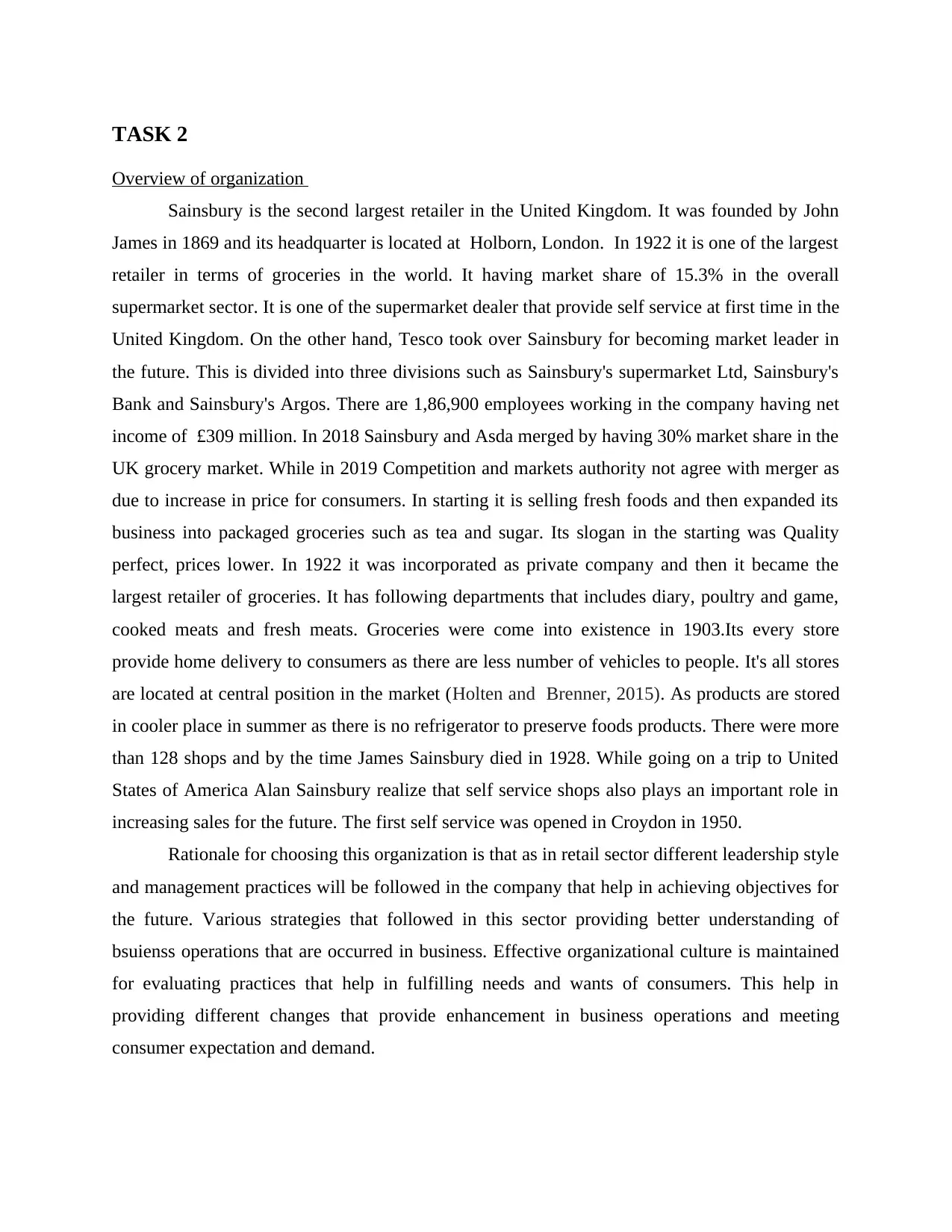
TASK 2
Overview of organization
Sainsbury is the second largest retailer in the United Kingdom. It was founded by John
James in 1869 and its headquarter is located at Holborn, London. In 1922 it is one of the largest
retailer in terms of groceries in the world. It having market share of 15.3% in the overall
supermarket sector. It is one of the supermarket dealer that provide self service at first time in the
United Kingdom. On the other hand, Tesco took over Sainsbury for becoming market leader in
the future. This is divided into three divisions such as Sainsbury's supermarket Ltd, Sainsbury's
Bank and Sainsbury's Argos. There are 1,86,900 employees working in the company having net
income of £309 million. In 2018 Sainsbury and Asda merged by having 30% market share in the
UK grocery market. While in 2019 Competition and markets authority not agree with merger as
due to increase in price for consumers. In starting it is selling fresh foods and then expanded its
business into packaged groceries such as tea and sugar. Its slogan in the starting was Quality
perfect, prices lower. In 1922 it was incorporated as private company and then it became the
largest retailer of groceries. It has following departments that includes diary, poultry and game,
cooked meats and fresh meats. Groceries were come into existence in 1903.Its every store
provide home delivery to consumers as there are less number of vehicles to people. It's all stores
are located at central position in the market (Holten and Brenner, 2015). As products are stored
in cooler place in summer as there is no refrigerator to preserve foods products. There were more
than 128 shops and by the time James Sainsbury died in 1928. While going on a trip to United
States of America Alan Sainsbury realize that self service shops also plays an important role in
increasing sales for the future. The first self service was opened in Croydon in 1950.
Rationale for choosing this organization is that as in retail sector different leadership style
and management practices will be followed in the company that help in achieving objectives for
the future. Various strategies that followed in this sector providing better understanding of
bsuienss operations that are occurred in business. Effective organizational culture is maintained
for evaluating practices that help in fulfilling needs and wants of consumers. This help in
providing different changes that provide enhancement in business operations and meeting
consumer expectation and demand.
Overview of organization
Sainsbury is the second largest retailer in the United Kingdom. It was founded by John
James in 1869 and its headquarter is located at Holborn, London. In 1922 it is one of the largest
retailer in terms of groceries in the world. It having market share of 15.3% in the overall
supermarket sector. It is one of the supermarket dealer that provide self service at first time in the
United Kingdom. On the other hand, Tesco took over Sainsbury for becoming market leader in
the future. This is divided into three divisions such as Sainsbury's supermarket Ltd, Sainsbury's
Bank and Sainsbury's Argos. There are 1,86,900 employees working in the company having net
income of £309 million. In 2018 Sainsbury and Asda merged by having 30% market share in the
UK grocery market. While in 2019 Competition and markets authority not agree with merger as
due to increase in price for consumers. In starting it is selling fresh foods and then expanded its
business into packaged groceries such as tea and sugar. Its slogan in the starting was Quality
perfect, prices lower. In 1922 it was incorporated as private company and then it became the
largest retailer of groceries. It has following departments that includes diary, poultry and game,
cooked meats and fresh meats. Groceries were come into existence in 1903.Its every store
provide home delivery to consumers as there are less number of vehicles to people. It's all stores
are located at central position in the market (Holten and Brenner, 2015). As products are stored
in cooler place in summer as there is no refrigerator to preserve foods products. There were more
than 128 shops and by the time James Sainsbury died in 1928. While going on a trip to United
States of America Alan Sainsbury realize that self service shops also plays an important role in
increasing sales for the future. The first self service was opened in Croydon in 1950.
Rationale for choosing this organization is that as in retail sector different leadership style
and management practices will be followed in the company that help in achieving objectives for
the future. Various strategies that followed in this sector providing better understanding of
bsuienss operations that are occurred in business. Effective organizational culture is maintained
for evaluating practices that help in fulfilling needs and wants of consumers. This help in
providing different changes that provide enhancement in business operations and meeting
consumer expectation and demand.
⊘ This is a preview!⊘
Do you want full access?
Subscribe today to unlock all pages.

Trusted by 1+ million students worldwide
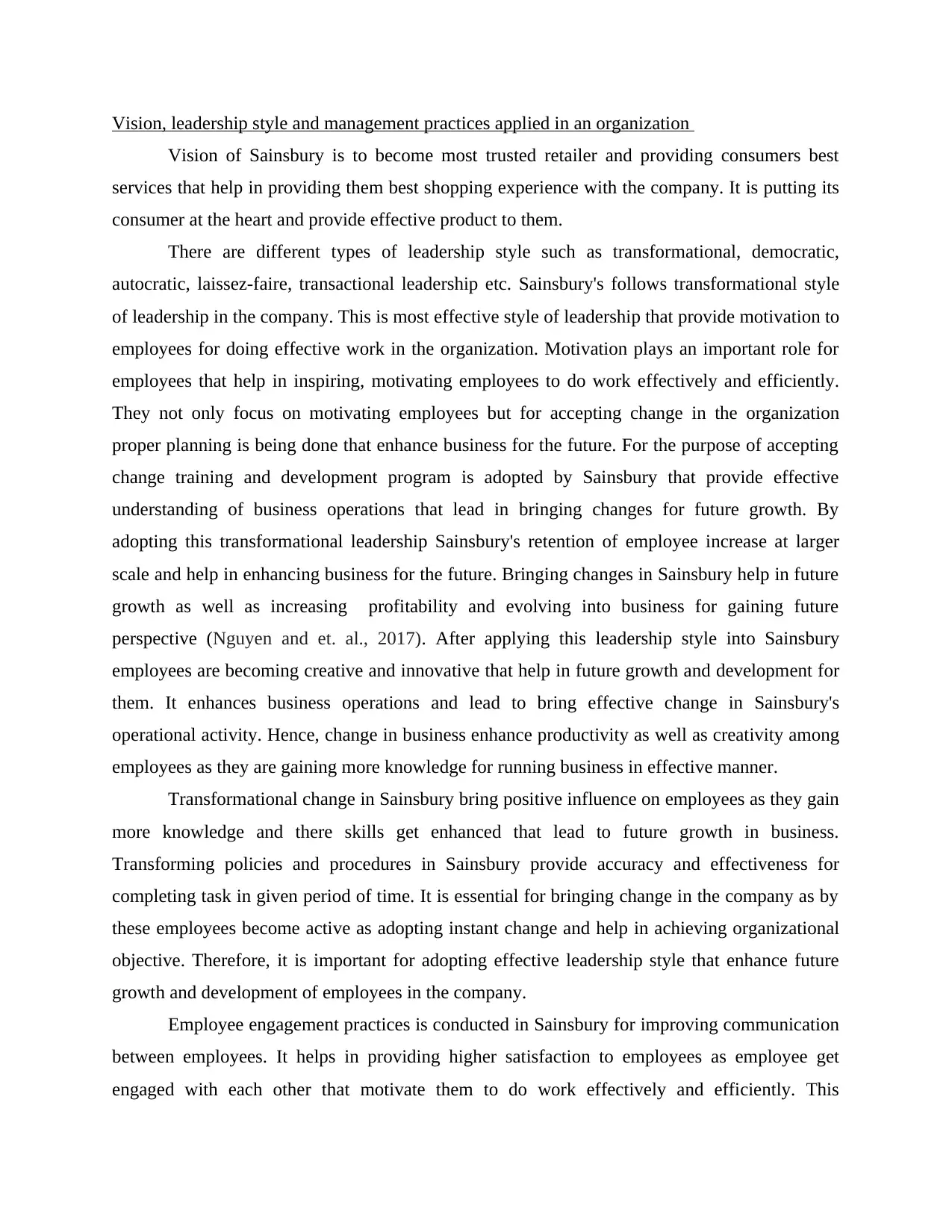
Vision, leadership style and management practices applied in an organization
Vision of Sainsbury is to become most trusted retailer and providing consumers best
services that help in providing them best shopping experience with the company. It is putting its
consumer at the heart and provide effective product to them.
There are different types of leadership style such as transformational, democratic,
autocratic, laissez-faire, transactional leadership etc. Sainsbury's follows transformational style
of leadership in the company. This is most effective style of leadership that provide motivation to
employees for doing effective work in the organization. Motivation plays an important role for
employees that help in inspiring, motivating employees to do work effectively and efficiently.
They not only focus on motivating employees but for accepting change in the organization
proper planning is being done that enhance business for the future. For the purpose of accepting
change training and development program is adopted by Sainsbury that provide effective
understanding of business operations that lead in bringing changes for future growth. By
adopting this transformational leadership Sainsbury's retention of employee increase at larger
scale and help in enhancing business for the future. Bringing changes in Sainsbury help in future
growth as well as increasing profitability and evolving into business for gaining future
perspective (Nguyen and et. al., 2017). After applying this leadership style into Sainsbury
employees are becoming creative and innovative that help in future growth and development for
them. It enhances business operations and lead to bring effective change in Sainsbury's
operational activity. Hence, change in business enhance productivity as well as creativity among
employees as they are gaining more knowledge for running business in effective manner.
Transformational change in Sainsbury bring positive influence on employees as they gain
more knowledge and there skills get enhanced that lead to future growth in business.
Transforming policies and procedures in Sainsbury provide accuracy and effectiveness for
completing task in given period of time. It is essential for bringing change in the company as by
these employees become active as adopting instant change and help in achieving organizational
objective. Therefore, it is important for adopting effective leadership style that enhance future
growth and development of employees in the company.
Employee engagement practices is conducted in Sainsbury for improving communication
between employees. It helps in providing higher satisfaction to employees as employee get
engaged with each other that motivate them to do work effectively and efficiently. This
Vision of Sainsbury is to become most trusted retailer and providing consumers best
services that help in providing them best shopping experience with the company. It is putting its
consumer at the heart and provide effective product to them.
There are different types of leadership style such as transformational, democratic,
autocratic, laissez-faire, transactional leadership etc. Sainsbury's follows transformational style
of leadership in the company. This is most effective style of leadership that provide motivation to
employees for doing effective work in the organization. Motivation plays an important role for
employees that help in inspiring, motivating employees to do work effectively and efficiently.
They not only focus on motivating employees but for accepting change in the organization
proper planning is being done that enhance business for the future. For the purpose of accepting
change training and development program is adopted by Sainsbury that provide effective
understanding of business operations that lead in bringing changes for future growth. By
adopting this transformational leadership Sainsbury's retention of employee increase at larger
scale and help in enhancing business for the future. Bringing changes in Sainsbury help in future
growth as well as increasing profitability and evolving into business for gaining future
perspective (Nguyen and et. al., 2017). After applying this leadership style into Sainsbury
employees are becoming creative and innovative that help in future growth and development for
them. It enhances business operations and lead to bring effective change in Sainsbury's
operational activity. Hence, change in business enhance productivity as well as creativity among
employees as they are gaining more knowledge for running business in effective manner.
Transformational change in Sainsbury bring positive influence on employees as they gain
more knowledge and there skills get enhanced that lead to future growth in business.
Transforming policies and procedures in Sainsbury provide accuracy and effectiveness for
completing task in given period of time. It is essential for bringing change in the company as by
these employees become active as adopting instant change and help in achieving organizational
objective. Therefore, it is important for adopting effective leadership style that enhance future
growth and development of employees in the company.
Employee engagement practices is conducted in Sainsbury for improving communication
between employees. It helps in providing higher satisfaction to employees as employee get
engaged with each other that motivate them to do work effectively and efficiently. This
Paraphrase This Document
Need a fresh take? Get an instant paraphrase of this document with our AI Paraphraser
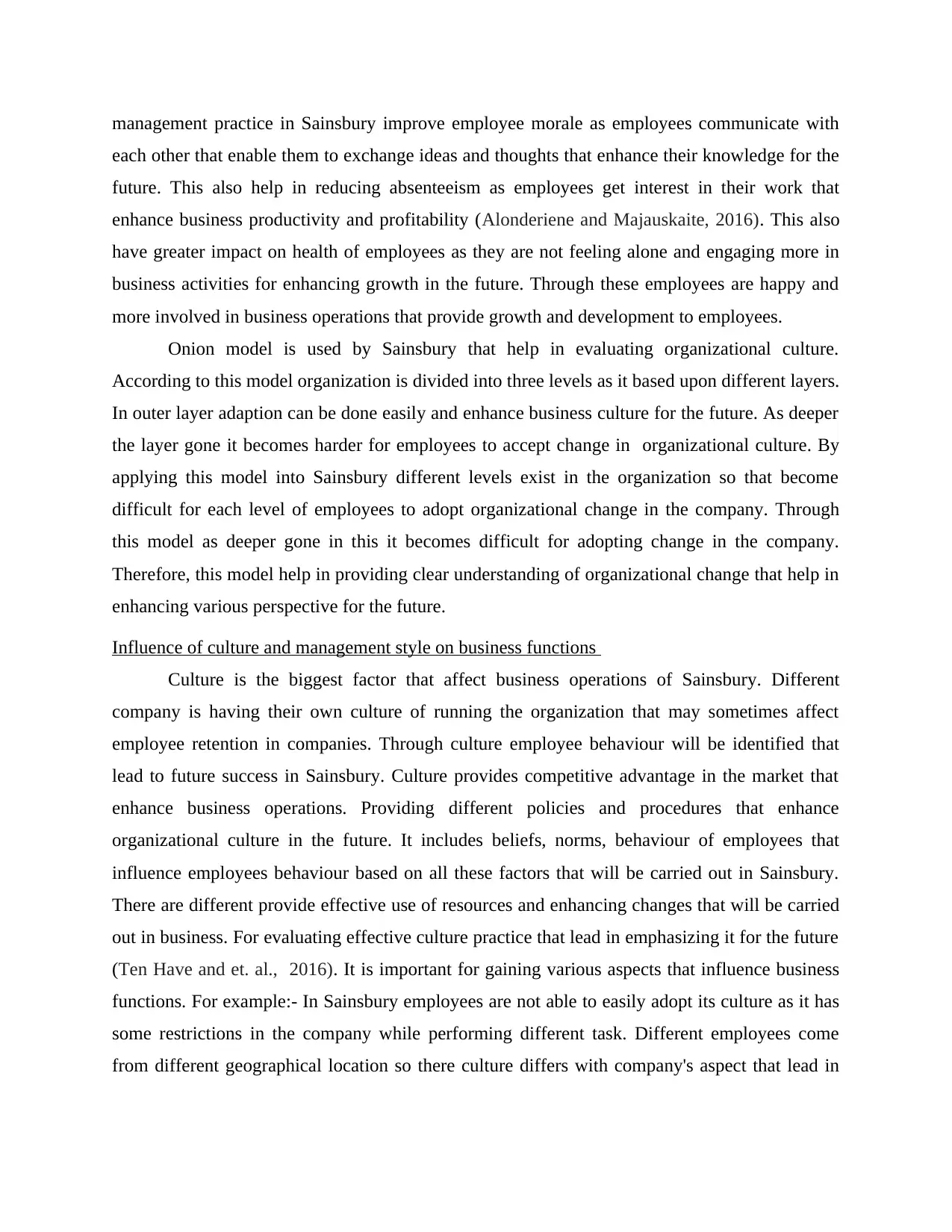
management practice in Sainsbury improve employee morale as employees communicate with
each other that enable them to exchange ideas and thoughts that enhance their knowledge for the
future. This also help in reducing absenteeism as employees get interest in their work that
enhance business productivity and profitability (Alonderiene and Majauskaite, 2016). This also
have greater impact on health of employees as they are not feeling alone and engaging more in
business activities for enhancing growth in the future. Through these employees are happy and
more involved in business operations that provide growth and development to employees.
Onion model is used by Sainsbury that help in evaluating organizational culture.
According to this model organization is divided into three levels as it based upon different layers.
In outer layer adaption can be done easily and enhance business culture for the future. As deeper
the layer gone it becomes harder for employees to accept change in organizational culture. By
applying this model into Sainsbury different levels exist in the organization so that become
difficult for each level of employees to adopt organizational change in the company. Through
this model as deeper gone in this it becomes difficult for adopting change in the company.
Therefore, this model help in providing clear understanding of organizational change that help in
enhancing various perspective for the future.
Influence of culture and management style on business functions
Culture is the biggest factor that affect business operations of Sainsbury. Different
company is having their own culture of running the organization that may sometimes affect
employee retention in companies. Through culture employee behaviour will be identified that
lead to future success in Sainsbury. Culture provides competitive advantage in the market that
enhance business operations. Providing different policies and procedures that enhance
organizational culture in the future. It includes beliefs, norms, behaviour of employees that
influence employees behaviour based on all these factors that will be carried out in Sainsbury.
There are different provide effective use of resources and enhancing changes that will be carried
out in business. For evaluating effective culture practice that lead in emphasizing it for the future
(Ten Have and et. al., 2016). It is important for gaining various aspects that influence business
functions. For example:- In Sainsbury employees are not able to easily adopt its culture as it has
some restrictions in the company while performing different task. Different employees come
from different geographical location so there culture differs with company's aspect that lead in
each other that enable them to exchange ideas and thoughts that enhance their knowledge for the
future. This also help in reducing absenteeism as employees get interest in their work that
enhance business productivity and profitability (Alonderiene and Majauskaite, 2016). This also
have greater impact on health of employees as they are not feeling alone and engaging more in
business activities for enhancing growth in the future. Through these employees are happy and
more involved in business operations that provide growth and development to employees.
Onion model is used by Sainsbury that help in evaluating organizational culture.
According to this model organization is divided into three levels as it based upon different layers.
In outer layer adaption can be done easily and enhance business culture for the future. As deeper
the layer gone it becomes harder for employees to accept change in organizational culture. By
applying this model into Sainsbury different levels exist in the organization so that become
difficult for each level of employees to adopt organizational change in the company. Through
this model as deeper gone in this it becomes difficult for adopting change in the company.
Therefore, this model help in providing clear understanding of organizational change that help in
enhancing various perspective for the future.
Influence of culture and management style on business functions
Culture is the biggest factor that affect business operations of Sainsbury. Different
company is having their own culture of running the organization that may sometimes affect
employee retention in companies. Through culture employee behaviour will be identified that
lead to future success in Sainsbury. Culture provides competitive advantage in the market that
enhance business operations. Providing different policies and procedures that enhance
organizational culture in the future. It includes beliefs, norms, behaviour of employees that
influence employees behaviour based on all these factors that will be carried out in Sainsbury.
There are different provide effective use of resources and enhancing changes that will be carried
out in business. For evaluating effective culture practice that lead in emphasizing it for the future
(Ten Have and et. al., 2016). It is important for gaining various aspects that influence business
functions. For example:- In Sainsbury employees are not able to easily adopt its culture as it has
some restrictions in the company while performing different task. Different employees come
from different geographical location so there culture differs with company's aspect that lead in
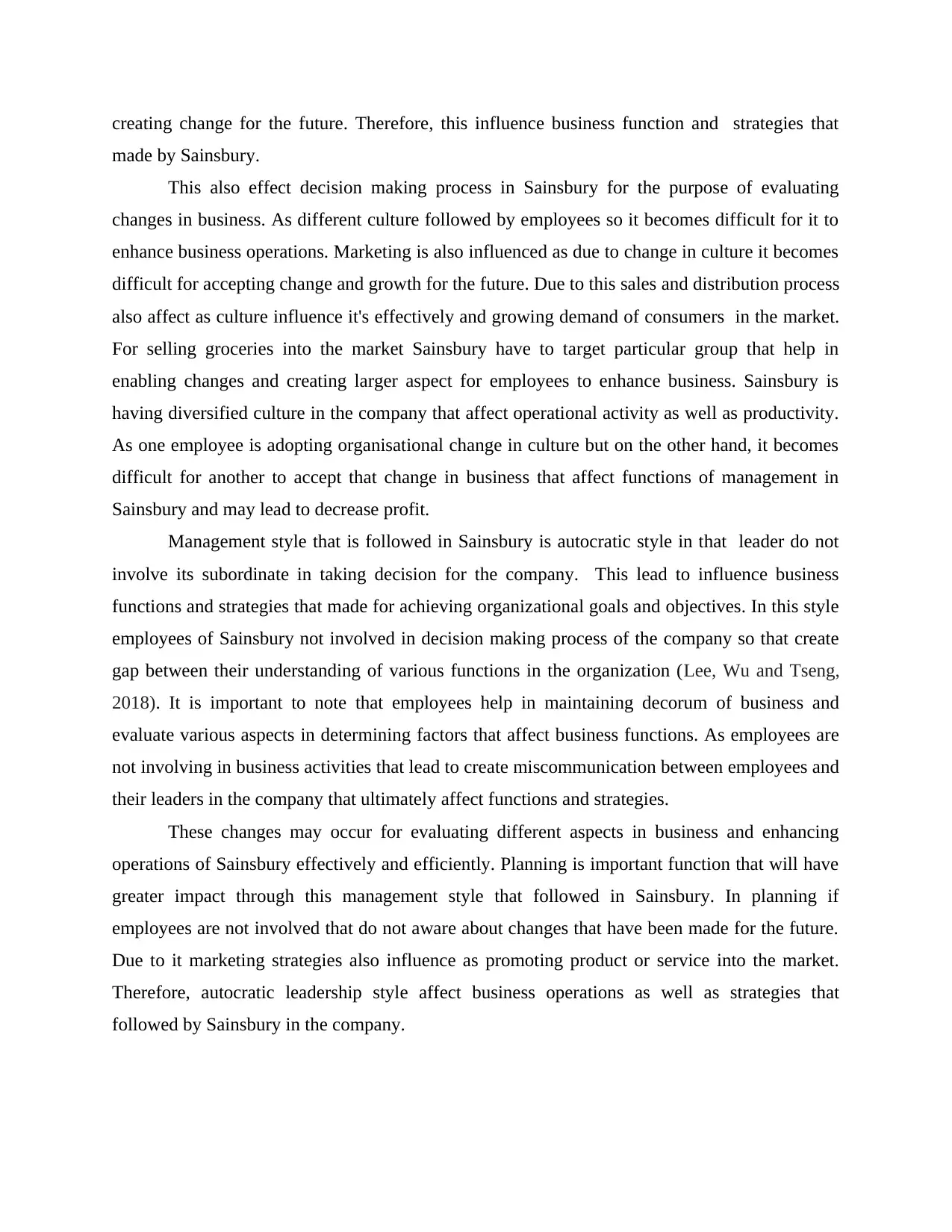
creating change for the future. Therefore, this influence business function and strategies that
made by Sainsbury.
This also effect decision making process in Sainsbury for the purpose of evaluating
changes in business. As different culture followed by employees so it becomes difficult for it to
enhance business operations. Marketing is also influenced as due to change in culture it becomes
difficult for accepting change and growth for the future. Due to this sales and distribution process
also affect as culture influence it's effectively and growing demand of consumers in the market.
For selling groceries into the market Sainsbury have to target particular group that help in
enabling changes and creating larger aspect for employees to enhance business. Sainsbury is
having diversified culture in the company that affect operational activity as well as productivity.
As one employee is adopting organisational change in culture but on the other hand, it becomes
difficult for another to accept that change in business that affect functions of management in
Sainsbury and may lead to decrease profit.
Management style that is followed in Sainsbury is autocratic style in that leader do not
involve its subordinate in taking decision for the company. This lead to influence business
functions and strategies that made for achieving organizational goals and objectives. In this style
employees of Sainsbury not involved in decision making process of the company so that create
gap between their understanding of various functions in the organization (Lee, Wu and Tseng,
2018). It is important to note that employees help in maintaining decorum of business and
evaluate various aspects in determining factors that affect business functions. As employees are
not involving in business activities that lead to create miscommunication between employees and
their leaders in the company that ultimately affect functions and strategies.
These changes may occur for evaluating different aspects in business and enhancing
operations of Sainsbury effectively and efficiently. Planning is important function that will have
greater impact through this management style that followed in Sainsbury. In planning if
employees are not involved that do not aware about changes that have been made for the future.
Due to it marketing strategies also influence as promoting product or service into the market.
Therefore, autocratic leadership style affect business operations as well as strategies that
followed by Sainsbury in the company.
made by Sainsbury.
This also effect decision making process in Sainsbury for the purpose of evaluating
changes in business. As different culture followed by employees so it becomes difficult for it to
enhance business operations. Marketing is also influenced as due to change in culture it becomes
difficult for accepting change and growth for the future. Due to this sales and distribution process
also affect as culture influence it's effectively and growing demand of consumers in the market.
For selling groceries into the market Sainsbury have to target particular group that help in
enabling changes and creating larger aspect for employees to enhance business. Sainsbury is
having diversified culture in the company that affect operational activity as well as productivity.
As one employee is adopting organisational change in culture but on the other hand, it becomes
difficult for another to accept that change in business that affect functions of management in
Sainsbury and may lead to decrease profit.
Management style that is followed in Sainsbury is autocratic style in that leader do not
involve its subordinate in taking decision for the company. This lead to influence business
functions and strategies that made for achieving organizational goals and objectives. In this style
employees of Sainsbury not involved in decision making process of the company so that create
gap between their understanding of various functions in the organization (Lee, Wu and Tseng,
2018). It is important to note that employees help in maintaining decorum of business and
evaluate various aspects in determining factors that affect business functions. As employees are
not involving in business activities that lead to create miscommunication between employees and
their leaders in the company that ultimately affect functions and strategies.
These changes may occur for evaluating different aspects in business and enhancing
operations of Sainsbury effectively and efficiently. Planning is important function that will have
greater impact through this management style that followed in Sainsbury. In planning if
employees are not involved that do not aware about changes that have been made for the future.
Due to it marketing strategies also influence as promoting product or service into the market.
Therefore, autocratic leadership style affect business operations as well as strategies that
followed by Sainsbury in the company.
⊘ This is a preview!⊘
Do you want full access?
Subscribe today to unlock all pages.

Trusted by 1+ million students worldwide
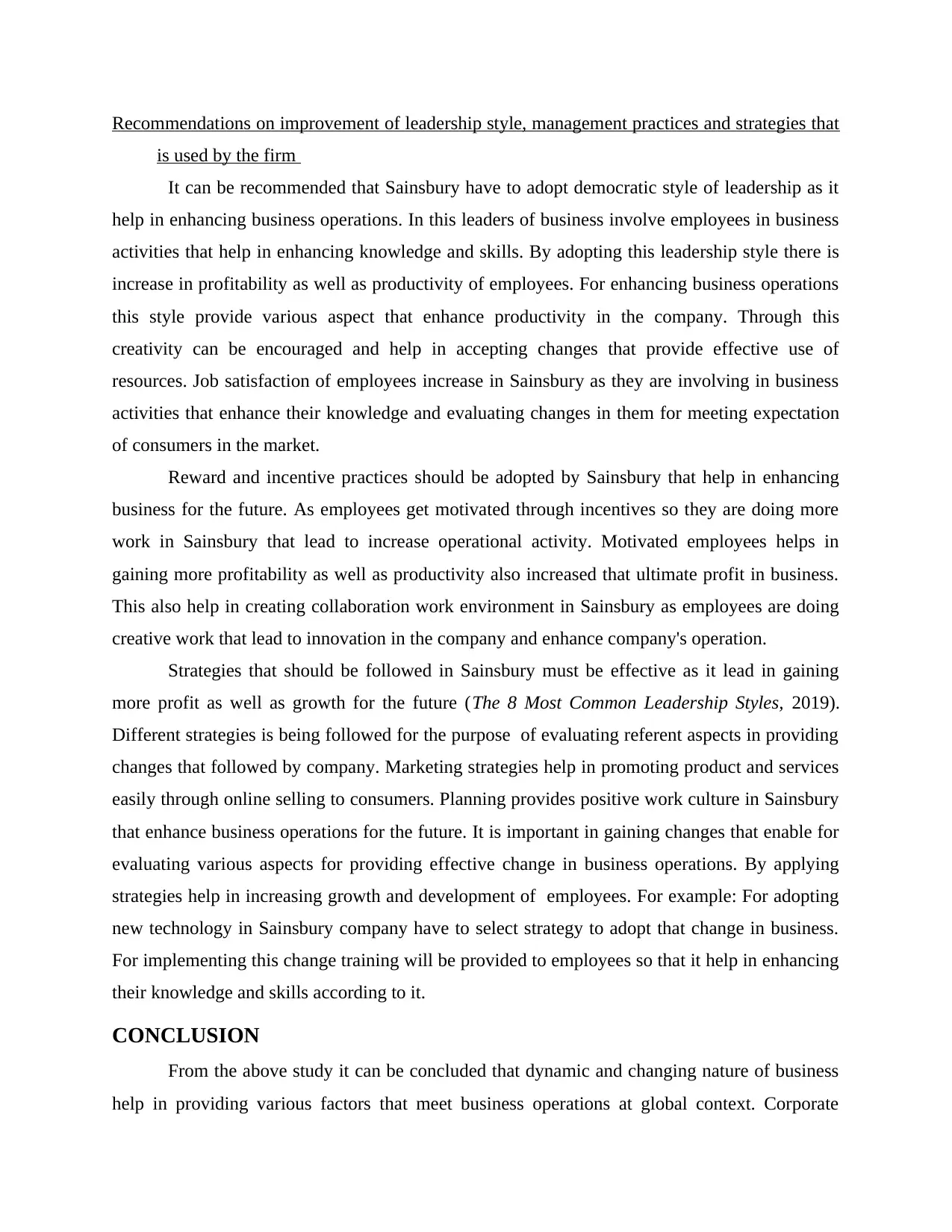
Recommendations on improvement of leadership style, management practices and strategies that
is used by the firm
It can be recommended that Sainsbury have to adopt democratic style of leadership as it
help in enhancing business operations. In this leaders of business involve employees in business
activities that help in enhancing knowledge and skills. By adopting this leadership style there is
increase in profitability as well as productivity of employees. For enhancing business operations
this style provide various aspect that enhance productivity in the company. Through this
creativity can be encouraged and help in accepting changes that provide effective use of
resources. Job satisfaction of employees increase in Sainsbury as they are involving in business
activities that enhance their knowledge and evaluating changes in them for meeting expectation
of consumers in the market.
Reward and incentive practices should be adopted by Sainsbury that help in enhancing
business for the future. As employees get motivated through incentives so they are doing more
work in Sainsbury that lead to increase operational activity. Motivated employees helps in
gaining more profitability as well as productivity also increased that ultimate profit in business.
This also help in creating collaboration work environment in Sainsbury as employees are doing
creative work that lead to innovation in the company and enhance company's operation.
Strategies that should be followed in Sainsbury must be effective as it lead in gaining
more profit as well as growth for the future (The 8 Most Common Leadership Styles, 2019).
Different strategies is being followed for the purpose of evaluating referent aspects in providing
changes that followed by company. Marketing strategies help in promoting product and services
easily through online selling to consumers. Planning provides positive work culture in Sainsbury
that enhance business operations for the future. It is important in gaining changes that enable for
evaluating various aspects for providing effective change in business operations. By applying
strategies help in increasing growth and development of employees. For example: For adopting
new technology in Sainsbury company have to select strategy to adopt that change in business.
For implementing this change training will be provided to employees so that it help in enhancing
their knowledge and skills according to it.
CONCLUSION
From the above study it can be concluded that dynamic and changing nature of business
help in providing various factors that meet business operations at global context. Corporate
is used by the firm
It can be recommended that Sainsbury have to adopt democratic style of leadership as it
help in enhancing business operations. In this leaders of business involve employees in business
activities that help in enhancing knowledge and skills. By adopting this leadership style there is
increase in profitability as well as productivity of employees. For enhancing business operations
this style provide various aspect that enhance productivity in the company. Through this
creativity can be encouraged and help in accepting changes that provide effective use of
resources. Job satisfaction of employees increase in Sainsbury as they are involving in business
activities that enhance their knowledge and evaluating changes in them for meeting expectation
of consumers in the market.
Reward and incentive practices should be adopted by Sainsbury that help in enhancing
business for the future. As employees get motivated through incentives so they are doing more
work in Sainsbury that lead to increase operational activity. Motivated employees helps in
gaining more profitability as well as productivity also increased that ultimate profit in business.
This also help in creating collaboration work environment in Sainsbury as employees are doing
creative work that lead to innovation in the company and enhance company's operation.
Strategies that should be followed in Sainsbury must be effective as it lead in gaining
more profit as well as growth for the future (The 8 Most Common Leadership Styles, 2019).
Different strategies is being followed for the purpose of evaluating referent aspects in providing
changes that followed by company. Marketing strategies help in promoting product and services
easily through online selling to consumers. Planning provides positive work culture in Sainsbury
that enhance business operations for the future. It is important in gaining changes that enable for
evaluating various aspects for providing effective change in business operations. By applying
strategies help in increasing growth and development of employees. For example: For adopting
new technology in Sainsbury company have to select strategy to adopt that change in business.
For implementing this change training will be provided to employees so that it help in enhancing
their knowledge and skills according to it.
CONCLUSION
From the above study it can be concluded that dynamic and changing nature of business
help in providing various factors that meet business operations at global context. Corporate
Paraphrase This Document
Need a fresh take? Get an instant paraphrase of this document with our AI Paraphraser
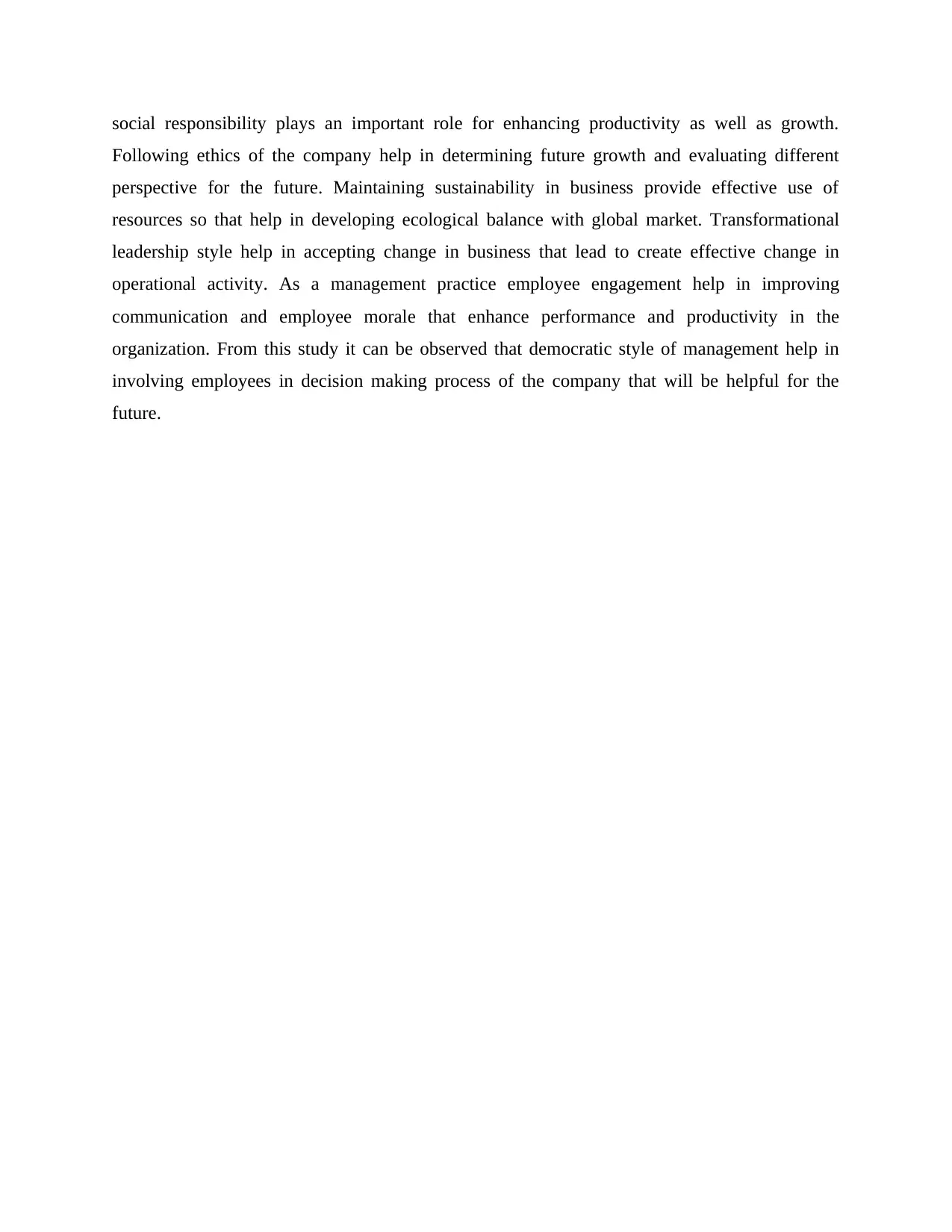
social responsibility plays an important role for enhancing productivity as well as growth.
Following ethics of the company help in determining future growth and evaluating different
perspective for the future. Maintaining sustainability in business provide effective use of
resources so that help in developing ecological balance with global market. Transformational
leadership style help in accepting change in business that lead to create effective change in
operational activity. As a management practice employee engagement help in improving
communication and employee morale that enhance performance and productivity in the
organization. From this study it can be observed that democratic style of management help in
involving employees in decision making process of the company that will be helpful for the
future.
Following ethics of the company help in determining future growth and evaluating different
perspective for the future. Maintaining sustainability in business provide effective use of
resources so that help in developing ecological balance with global market. Transformational
leadership style help in accepting change in business that lead to create effective change in
operational activity. As a management practice employee engagement help in improving
communication and employee morale that enhance performance and productivity in the
organization. From this study it can be observed that democratic style of management help in
involving employees in decision making process of the company that will be helpful for the
future.
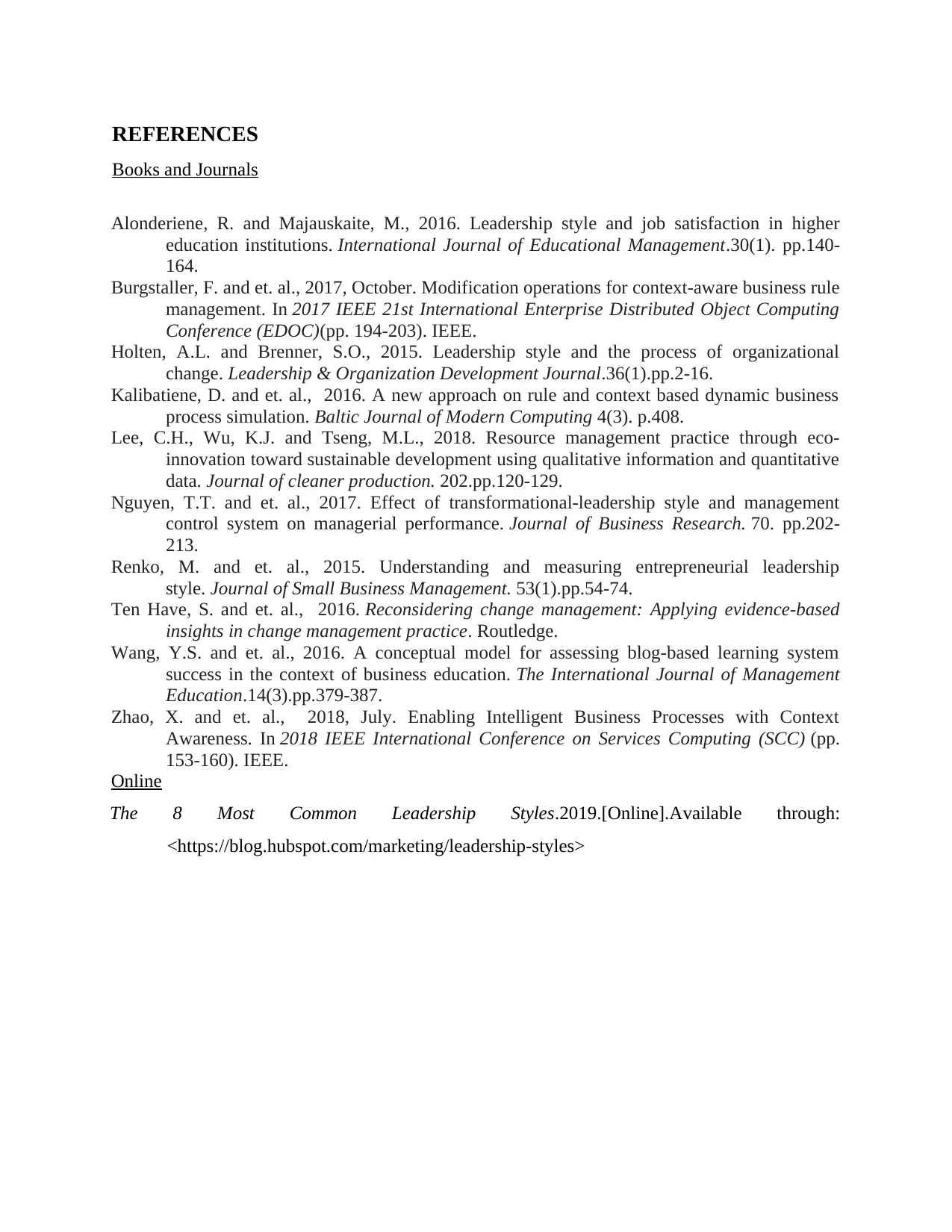
REFERENCES
Books and Journals
Alonderiene, R. and Majauskaite, M., 2016. Leadership style and job satisfaction in higher
education institutions. International Journal of Educational Management.30(1). pp.140-
164.
Burgstaller, F. and et. al., 2017, October. Modification operations for context-aware business rule
management. In 2017 IEEE 21st International Enterprise Distributed Object Computing
Conference (EDOC)(pp. 194-203). IEEE.
Holten, A.L. and Brenner, S.O., 2015. Leadership style and the process of organizational
change. Leadership & Organization Development Journal.36(1).pp.2-16.
Kalibatiene, D. and et. al., 2016. A new approach on rule and context based dynamic business
process simulation. Baltic Journal of Modern Computing 4(3). p.408.
Lee, C.H., Wu, K.J. and Tseng, M.L., 2018. Resource management practice through eco-
innovation toward sustainable development using qualitative information and quantitative
data. Journal of cleaner production. 202.pp.120-129.
Nguyen, T.T. and et. al., 2017. Effect of transformational-leadership style and management
control system on managerial performance. Journal of Business Research. 70. pp.202-
213.
Renko, M. and et. al., 2015. Understanding and measuring entrepreneurial leadership
style. Journal of Small Business Management. 53(1).pp.54-74.
Ten Have, S. and et. al., 2016. Reconsidering change management: Applying evidence-based
insights in change management practice. Routledge.
Wang, Y.S. and et. al., 2016. A conceptual model for assessing blog-based learning system
success in the context of business education. The International Journal of Management
Education.14(3).pp.379-387.
Zhao, X. and et. al., 2018, July. Enabling Intelligent Business Processes with Context
Awareness. In 2018 IEEE International Conference on Services Computing (SCC) (pp.
153-160). IEEE.
Online
The 8 Most Common Leadership Styles.2019.[Online].Available through:
<https://blog.hubspot.com/marketing/leadership-styles>
Books and Journals
Alonderiene, R. and Majauskaite, M., 2016. Leadership style and job satisfaction in higher
education institutions. International Journal of Educational Management.30(1). pp.140-
164.
Burgstaller, F. and et. al., 2017, October. Modification operations for context-aware business rule
management. In 2017 IEEE 21st International Enterprise Distributed Object Computing
Conference (EDOC)(pp. 194-203). IEEE.
Holten, A.L. and Brenner, S.O., 2015. Leadership style and the process of organizational
change. Leadership & Organization Development Journal.36(1).pp.2-16.
Kalibatiene, D. and et. al., 2016. A new approach on rule and context based dynamic business
process simulation. Baltic Journal of Modern Computing 4(3). p.408.
Lee, C.H., Wu, K.J. and Tseng, M.L., 2018. Resource management practice through eco-
innovation toward sustainable development using qualitative information and quantitative
data. Journal of cleaner production. 202.pp.120-129.
Nguyen, T.T. and et. al., 2017. Effect of transformational-leadership style and management
control system on managerial performance. Journal of Business Research. 70. pp.202-
213.
Renko, M. and et. al., 2015. Understanding and measuring entrepreneurial leadership
style. Journal of Small Business Management. 53(1).pp.54-74.
Ten Have, S. and et. al., 2016. Reconsidering change management: Applying evidence-based
insights in change management practice. Routledge.
Wang, Y.S. and et. al., 2016. A conceptual model for assessing blog-based learning system
success in the context of business education. The International Journal of Management
Education.14(3).pp.379-387.
Zhao, X. and et. al., 2018, July. Enabling Intelligent Business Processes with Context
Awareness. In 2018 IEEE International Conference on Services Computing (SCC) (pp.
153-160). IEEE.
Online
The 8 Most Common Leadership Styles.2019.[Online].Available through:
<https://blog.hubspot.com/marketing/leadership-styles>
⊘ This is a preview!⊘
Do you want full access?
Subscribe today to unlock all pages.

Trusted by 1+ million students worldwide
1 out of 12
Related Documents
Your All-in-One AI-Powered Toolkit for Academic Success.
+13062052269
info@desklib.com
Available 24*7 on WhatsApp / Email
![[object Object]](/_next/static/media/star-bottom.7253800d.svg)
Unlock your academic potential
Copyright © 2020–2026 A2Z Services. All Rights Reserved. Developed and managed by ZUCOL.



